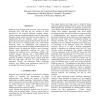Free Online Productivity Tools
i2Speak
i2Symbol
i2OCR
iTex2Img
iWeb2Print
iWeb2Shot
i2Type
iPdf2Split
iPdf2Merge
i2Bopomofo
i2Arabic
i2Style
i2Image
i2PDF
iLatex2Rtf
Sci2ools
111
click to vote
ISBI
2006
IEEE
2006
IEEE
Evaluation of anisotropic filters for diffusion tensor imaging
Diffusion tensor imaging (DTI) measures, such as fractional anisotropy (FA), and trace are very sensitive to noise contained in the acquired diffusion weighted images. Typical isotropic smoothing methods reduce the high spatial frequency image content and blur the image features. We hypothesized that the diffusion tensor would be an approximate anisotropic Gaussian filter function because the blur will tend to be oriented parallel to the white matter structures. Thus, we implemented and evaluated an anisotropic Gaussian kernel smoothing method based on the diffusion tensor for preserving diffusion tensor structural features while significantly reducing the noise. We compared the diffusion tensor anisotropic filtering with isotropic Gaussian filtering, and a Perona-Malik (PM) filtering algorithm, which was derived from the intensity gradients of diffusion weighted images. Human brain DTI data with high SNR was used as a gold standard for evaluation. Overall, the anisotropic filters per...
Anisotropic Gaussian Filter | Diffusion Tensor | Diffusion Weighted Images | ISBI 2006 | Medical Imaging |
Related Content
| Added | 20 Nov 2009 |
| Updated | 20 Nov 2009 |
| Type | Conference |
| Year | 2006 |
| Where | ISBI |
| Authors | Jee Eun Lee, Moo K. Chung, Andrew L. Alexander |
Comments (0)

